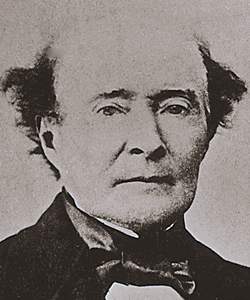Robert J. Walker (Congressional Biographical Directory)
Reference
WALKER, Robert John, a Senator from Mississippi; born in Northumberland, Pa., July 19, 1801; graduated from the University of Pennsylvania at Philadelphia in 1819; studied law; admitted to the bar in 1821 and commenced practice in Pittsburgh, Pa., the following year; moved to Natchez, Miss., in 1826 and continued the practice of law; elected as a Democrat to the United States Senate; reelected, and served from March 4, 1835, to March 5, 1845, when he resigned; chairman, Committee on Public Lands (Twenty-fourth through Twenty-sixth Congresses); Secretary of the Treasury in the Cabinet of President James K. Polk 1845-1849; declined the mission to China tendered by President Franklin Pierce in 1853; resumed the practice of law; appointed Governor of Kansas Territory in April 1857, but resigned in December 1857; United States financial agent to Europe 1863-1864; again engaged in the practice of law at Washington, D.C., and died there November 11, 1869; interment in Oak Hill Cemetery.
"Walker, Robert John," Biographical Directory of the United States Congress, 1774 to Present, http://bioguide.congress.gov/scripts/biodisplay.pl?index=W000067.
Robert J. Walker (Tindall, 1999)
Textbook
Just before Buchanan's inauguration the proslavery legislature called for an election of delegates to a constitutional convention. Since no provision was made for a referendum on the constitution, however, the governor vetoed the measure and the legislature overrode his veto. The Kansas governor resigned on the day Buchanan took office, and the new president replaced him with Robert J. Walker. A native Pennsylvanian who had made a political career in Mississippi and a former member of Polk's cabinet, Walker had greater prestige than his predecessors, and like contemporaries such as Houston of Texas, Foote of Mississippi, and Benton of Missouri, put the Union about slavery. In Kansas he scented a chance to advance the cause of both the Union and his party. Under popular sovereignty, fair elections would produce a state that would be both free and Democratic. Walker arrived in 1857, and with Buchanan's approval, pledged to the free-state elements that the new constitution would be submitted to a fair vote. But in spite of his pleas, he arrived too late to persuade free-state men to vote for convention delegates in elections they were sure had been rigged against them. Later, however, Walker did persuade the free-state leaders to vote in the election of a new territorial legislature.
George Brown Tindall and David E. Shi, eds., America: A Narrative History, 5th ed., vol. 1 (New York: W. W. Norton and Company, 1999), 705-706.
Robert J. Walker (Smith, 1906)
Textbook
Probably the angriest person in the United States was Walker, who found all his plans thwarted. He told Calhoun plainly that if the scheme were carried through he should oppose it with all his power. Calhoun replied that Buchanan himself favored the idea, whereas Walker in a passion retorted: "I consider such a submission of the question a vile fraud, a base counterfeit, and a wretched device to keep people from voting...I will not support it, but I will denounce it, no matter whether the administration sustains it or not." When the convention adjourned, leaving the vote to be taken on December 21 through its agents, the exasperated governor returned to Washington, as each of his predecessors had done, to lay the matter before the president.
Theodore Clarke Smith, “Parties and Slavery, 1850-1859,” The American Nation: A History, ed. Albert Bushnell Hart, vol. 18 (New York: Harper & Brothers, 1906), 216-217.




